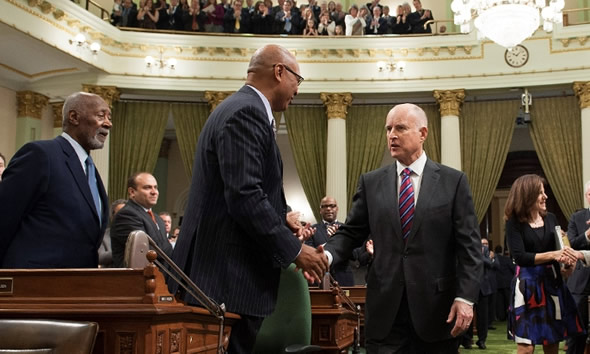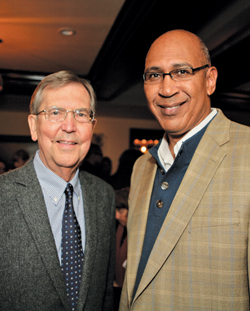
As Gov. Jerry Brown (right) enters the Assembly chambers for a swearing-in ceremony in December of 2014, he shakes hands with Pasadena native and state Assemblyman Chris Holden, while Chris’ father, Nate, looks on. Brown has worked with each of the Holdens during his two terms as governor (Nate was a state senator in 1974-78).
The nasty side of politics includes forgotten promises, backroom deals and leaders pushing personal agendas, even when it means pushing constituents into harm’s way.
But local politician Chris Holden’s first-hand knowledge of those types of dealings didn’t come from the state Assembly floor, where he serves today. The son of a longtime local politician, he learned those lessons the hard way on the hardwood, when politics pushed the big man to the back of the bench.
As the state’s tallest Assembly member tells it, Holden was a heavily recruited center coming out of Pasadena High School in the late 1970s and accepted San Diego State basketball coach Tim Vezie’s offer. By the end of his freshman season, the two-time CIF champ was starting in the middle for an Aztecs squad that had just joined the competitive Western Athletic Conference.
But, according to a then-unsuspecting Holden, San Diego State’s athletic director had told Vezie he needed to win 18 games to keep his job. And, in an effort to hand-pick Vezie’s successor, the athletic director proceeded to schedule heavyweights Kansas, the University of San Francisco, UCLA and just about any national power that would be favored against San Diego State.
Vezie’s plucky bunch of underdogs, including Holden as a key piece, ended up with a winning record in 1978-79, but fell three games short of the mandated win total. Vezie and his career winning record were history, and Holden immediately heard through the grapevine that he wasn’t the type of player that new coach Smokey Gaines favored.
“I’m sort of the mindset that when people think I can’t do something, I think I can,” said Holden, 54, who doubled down on his work ethic in the offseason to prove to Gaines that the freshman starter deserved an opportunity as a sophomore, too.
Gaines apparently disagreed, and the 1980-81 Aztecs won six games while Holden rode the pine. Undaunted, Holden tried to catch Gaines’ eye again as a junior — to no avail. Many would have transferred in that situation, but his father’s adage that “winners never quit and quitters never win” resonated. And so, prior to his senior year, Holden tirelessly committed to the idea of becoming a starter. Yet Holden’s career ended with him sitting on the bench.
There would be no Hollywood ending for the Southern California kid, but his collegiate basketball career served as his first real-world experience in politics.
“I went from a freshman starter to a senior bench rider, and as it turns out, I started to learn about politics,” said the Pasadena native, who is the Assembly majority floor leader. “I learned how sometimes things are not in your control.”
And sometimes, the little guy — or in Holden’s case, the 6-foot-8-inch guy — gets squeezed out. So in his 23 years on the Pasadena City Council and in two terms as Assemblyman for the 41st district (spanning from Pasadena to the edge of Claremont), Holden maintains that his constituents’ concerns are his chief priority.
Take a look at his legislation and you’ll see evidence of his looking out for everyone, highlighted by a proposed bill that would extend an exemption to allow La Verne residents to drive golf carts on city streets to solve a local university transportation issue. But that doesn’t mean Holden is always thinking small — as evidenced by his recent bill to extended human rights claims from two years to 10 in cases of torture and human trafficking, a proposal that received bipartisan unanimous support in the Assembly.
As for issues that affect every Californian currently, Holden’s got that covered, too: He’s hosting a community meeting on the drought at Kidspace Children’s Museum from 6 to 8 p.m. on Thursday, June 25. The event is open to the public and will feature experts from Jet Propulsion Laboratory, the state Water Resources Control Board and the local Department of Water and Power.
“I was always impressed with Chris because the more complex the problem, the better he rises to the occasion,” said former Pasadena City Manager Cynthia Kurtz. “He’s definitely a big-picture person, but he doesn’t miss the details. That’s when he really enjoys public policy making.”
 Before Bill Bogaard (left) served a Pasadena-record four consecutive terms as mayor beginning in 1999, Chris Holden was his predecessor and Pasadena’s second African-American mayor. Bogaard served for 18 years on the City Council while Holden served 23.
Before Bill Bogaard (left) served a Pasadena-record four consecutive terms as mayor beginning in 1999, Chris Holden was his predecessor and Pasadena’s second African-American mayor. Bogaard served for 18 years on the City Council while Holden served 23.
That Holden is making any kind of political move is surprising to himself and his family, despite the fact that former state senator and longtime Los Angeles City Councilman Nate Holden is his father. Growing up in Pasadena, the younger Holden never showed an inclination toward a political future. To him, politics just meant boring speeches and even more boring dinner events.
Despite the collegiate hoops struggle, Holden was on the radar of professional teams in Europe following graduation. While killing time awaiting a tryout for the next season, he took a graveyard shift working at a juvenile detention center. He saw despair in the eyes of children locked up for nonviolent crimes and the hate in the looks of teenaged convicted murderers, but the observation rooms were the worst: For suicidal cases, Holden’s task was to flip on the lights and peer in to make sure a detainee hadn’t committed the unthinkable.
As Holden made his rounds, he formulated a plan to help kids like these delinquents before they made poor choices. When Pasadena incumbent Mayor Loretta Glickman announced she would not seek re-election in 1985, the then-23-year-old tossed his hat in the City Council race.
Nate Holden remembers being conflicted by his son’s announcement.
“I told him, ‘Come on, this is a tough business. You sure you want to do this? You’re not out of your mind, are you?’” said Nate. “I’ve been through it all, right to left and top to bottom, and I didn’t want to subject him to the punishment.”
Holden remained steadfast. Five months into the campaign, Glickman reversed course to run against Holden and won re-election. But the upstart garnered a surprising 40% of the vote, then got involved civically with the Fair Oaks Avenue Redevelopment Project Area Committee and Pasadena Light Rail Alignment Task Force. Five years after losing to Glickman, he was elected as the youngest City Council member in Pasadena history, and later became the second African-American mayor (Glickman was the first, as well as the first female mayor). Holden also served as commissioner and president of the Burbank-Glendale-Pasadena Airport Authority.
Holden called his time on the Pasadena City Council “rewarding” and one of the greatest opportunities of his life. Despite a sometimes-volatile relationship among council members during his tenure between 1989 and 2012, the council led the city through affordable housing issues, job creation and a major revitalization period that simultaneously preserved parts of Pasadena while stimulating business and modernizing infrastructure.
“[City government] is the ultimate in transparency,” said Holden. “Your decision-making is right in front of the people who will be impacted the most.”
After more than two decades serving Pasadena, Holden won a seat in the state Assembly and served a district of nearly half a million people in the San Gabriel Mountain foothills.
By nearly any measure, Holden’s first term in the Assembly was a success, as he saw 13 of his proposed measures signed into law while championing the ongoing extension of the Gold Line. In 2014, Holden won re-election with nearly 60% of the vote and has remained busy with a multitude of new proposals, many focusing on education.
Holden is making friends in high places, too. In addition to being named majority floor leader in just his second term, Holden was recently invited by Gov. Jerry Brown to join an international trade conference in Mexico City, studying Mexican and California business relations. Interestingly enough, Brown has worked with both Chris and Nate Holden, as Brown’s first term as governor from 1975-83 coincided with Nate’s service as a state senator.
Nate never doubted his son’s work ethic, not after watching him wake up early each morning in high school to get up more shots on the court in an effort to draw the attention of collegiate programs. While admitting to being surprised that Chris entered politics, Nate said the 41st District has begun to learn what he knew all along.
